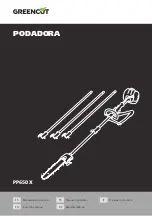
4 Power tool use and care
a
Do not force the power tool. Use
the correct power tool for your
application.
The correct power tool
will do the job better and safer at the
rate for which it was designed.
b
Do not use the power tool if the
switch does not turn it on and off.
Any power tool that cannot be
controlled with the switch is
dangerous and must be repaired.
c
Disconnect the plug from the
power source before making any
adjustments, changing
accessories, or storing power tools.
Such preventive safety measures
reduce the risk of starting the power
tool accidentally.
d
Store idle power tools out of the
reach of children and do not allow
persons unfamiliar with the power
tool or these instructions to operate
the power tool.
Power tools are
dangerous in the hands of untrained
users.
e
Maintain power tools. Check for
misalignment or binding of moving
parts, breakage of parts and any
other condition that may affect the
power tool’s operation. If damaged,
have the power tool repaired
before use.
Many accidents are
caused by poorly maintained power
tools.
f
Keep cutting tools sharp and clean.
Properly maintained cutting tools with
sharp cutting edges are less likely to
bind and are easier to control.
g
Use the power tool, accessories
and tool bits etc. in accordance
with these instructions, taking into
account the working conditions
and the work to be performed.
Use
of the power tool for operations
different from those intended could
result in a hazardous situation.
5 Service
a
Have your power tool serviced by a
qualified repair person using only
identical replacement parts.
This
will ensure that the safety of the
power tool is maintained.
6 – Safety instructions
relating specifically to
the equipment
Safety notes for all saws/sawing
procedures
a)
DANGER: Keep hands away from
the cutting area and blade. Hold
the additional handle or the engine
housing with your other hand.
If
both hands are holding the saw, the
saw blade will not be able injure
them.
b)
Do not reach underneath the work
piece.
The protective cover is not
able to protect you from the saw
blade if your hands are under the
work piece.
c)
Adjust the cutting depth to the
thickness of the work piece.
Less
than a full tooth height below the
work piece should be visible.
d)
Never hold the work piece that is
being cut in your hands or across
your leg. Secure the work piece to
a stable platform.
It is important to
support the work properly to
minimise body exposure, blade
binding, or loss of control.
41
5403520-Handkreiss_man 06.02.15 13:34 Seite 41
















































